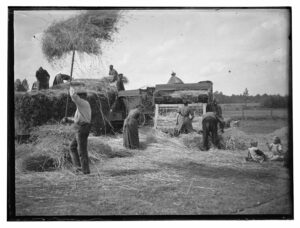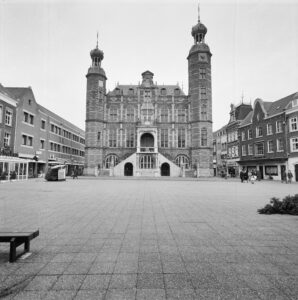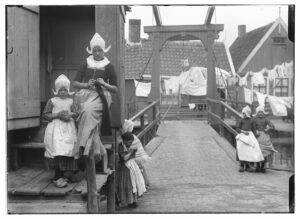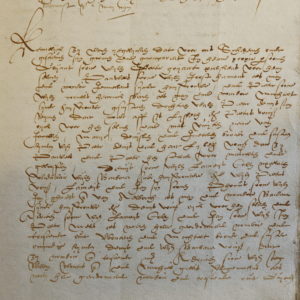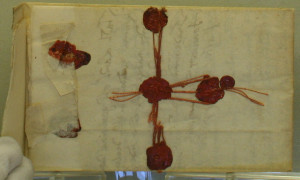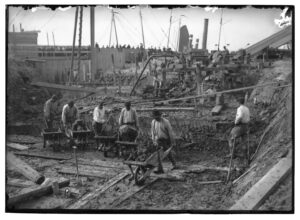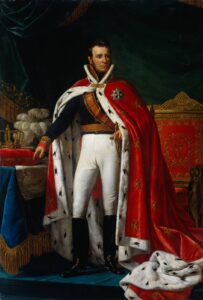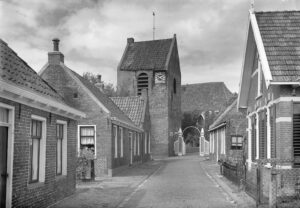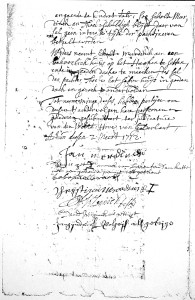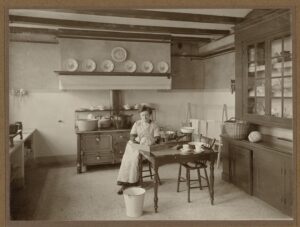Dorsen means to thresh. The person doing the threshing is the dorser. You will not often find that as an occupation as it was just one of many jobs farms or their laborers did. … [Read more...]
Dutch term – Stadhuis
The stadhuis (literally: city house) is the town hall. Town hall is where people would register births and deaths for the civil registration, and where civil marriages would take place. It was often the place where the aldermen's court convened, and where the town clerks kept their registers. … [Read more...]
Dutch term – Kind, kinderen
A kind is a child, plural kinderen. You may come across the term in wills, guardian appointments or other types of notarial and court records. … [Read more...]
Dutch term – Boedelscheiding
A boedelscheiding is an estate division. This often happened after someone died. An estate division record will include details about the estate and will list who got what. These records can typically be found in notarial records, or in voluntary court records before 1811 in regions where there were no notaries. If there was not much to divide, the estate may have been divided informally without there being an official record. … [Read more...]
Dutch term – Beschikbaar, beschikbaarheid
Beschikbaar means available; beschikbaarheid means availability. You may come across the terms in finding aids and texts discussing how to consult records. For example, a finding aid may include a section about availability to discuss where the records are kept, how they can be accessed, whether they are available online, or whether there are access restrictions to consider. … [Read more...]
Dutch term – Grondwerker
A grondwerker (literally: ground worker) was a digger. Diggers could be employed by builders, to dig foundation trenches, or by canal builders. It was hard, low-paying work. … [Read more...]
Dutch term – Koninkrijk
Koninkrijk means kingdom. The Netherlands was the Dutch Republic until 1795, when the French occupied the country. It became the Kingdom of Holland in 1806, with Louis Napoleon as its first king. It was part of the French empire from 1810 to 1813. After the defeat of the French, it became the Kingdom of the Netherlands in 1813. The House of Orange has supplied the monarchs ever since. Kings of Holland Louis Napoleon (1806-1810) Kings and Queens of the Netherlands Willem I … [Read more...]
Dutch Term – Nederlands Hervormd
Nederlands Hervormd means Dutch Reformed, a protestant religion. You may come across the term in population registers or church records. The Dutch Reformed church adopted that name in 1816. Before that, it was known as Nederduits Gereformeerd [Nederdutch Reformed]. There are many other protestant religions that split off from the main Dutch Reformed church, including Gereformeerd [Christian Reformed]. … [Read more...]
Dutch term – Huur
Huur is a noun meaning rent. The verb huren means to rent, and verhuren means to let out (huren is from the viewpoint of the renter, verhuren from the viewpoint of the owner). Many people rented houses and/or land. Historically, most people in the Netherlands were too poor to own their own houses, and rented them instead. The owners were often richer people in the town, noble families, churches, or (especially in earlier periods), monasteries and convents. Some rental contracts were made … [Read more...]
Dutch term – Keuken
The keuken is the kitchen. You may come across the term in estate inventories, where the items in the house are tallied by room. Kitchens originally had open fires, then hearths, and in the 19th and 20th century this gradually changed to stoves. Small houses where poor people lived did not typically have a separate kitchen. They would cook over the hearth fire or furnace in the living room. … [Read more...]
